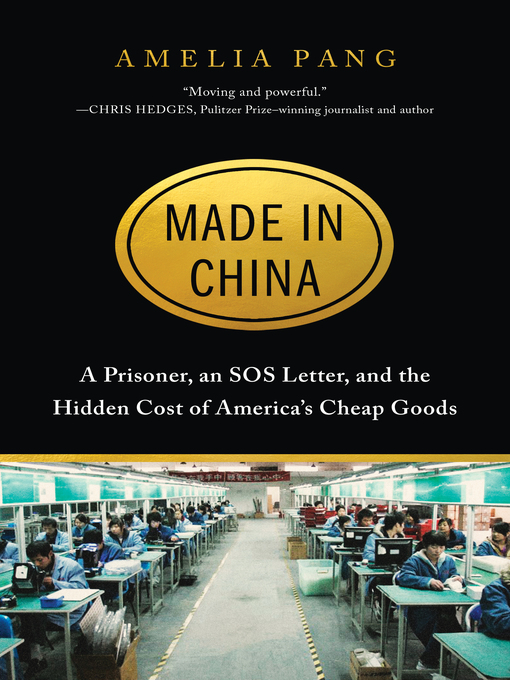
Made in China
A Prisoner, an SOS Letter, and the Hidden Cost of America's Cheap Goods
کتاب های مرتبط
- اطلاعات
- نقد و بررسی
- دیدگاه کاربران
نقد و بررسی

Starred review from October 26, 2020
Journalist Pang debuts with a vivid and powerful report on Chinese forced labor camps and their connections to the American marketplace. She spotlights the story of political prisoner Sun Yi, a follower of the banned spiritual movement Falun Gong, who inserted handwritten notes into the boxes of Halloween decorations he packaged at a camp in northeastern China. In 2012, two years after Sun’s release, an Oregon woman found one of his notes in a box of foam gravestones. The resulting media coverage led to widespread condemnation of China’s labor practices, Pang writes, but only superficial changes. Her cinematic narrative alternates between Sun’s traumatic experiences and an overview of the political history, cultural prejudices, and economic factors behind China’s system of “reeducation through labor.” She also explores loopholes in U.S. laws that might otherwise prevent imports from the camps, and how American consumers searching for cheap products and the latest trends create an incentive for China to continue its brutal labor practices. Noting that China responds to “financial pushback,” she urges consumers to hold their favorite brands to account for the conditions under which their goods are produced. Engrossing and deeply reported, this impressive exposé will make readers think twice about their next purchase.

December 1, 2020
If a product is made in China, this book reveals, it's likely made by prisoners. Pang's story beings with an Oregon woman who, while opening a package of foam headstones for Halloween decorations, discovered a note written on onionskin paper describing the plight of prisoners in a labor camp in China: "People who work here, have to work 15 hours a day with out [sic] Saturday, Sunday break and any holidays, otherwise, they will suffer torturement, beat and rude remark, nearly no payment." The note also pointed out that many of the prisoners were members of Falun Gong, a group that added a religious--and then dissident--element to the traditional practice of qi gong. From that starting point, Pang describes not just the fate of the writer of that note--one of many that consumers in the West discovered in packages containing Chinese-made goods--but also the astonishingly comprehensive and oppressive Chinese penal system. Of that writer, blameless apart from his criticism of the government, Pang observes, "I felt that [his] fight for freedom and his subsequent imprisonment was emblematic of a much broader human rights issue, which extends beyond Falun Gong." Indeed, the "laogai system" is the world's "largest forced-labor system," embracing labor camps, outright prisons, and even drug rehab centers; those who are sentenced to "reeducation through labor" have no recourse to courts but are sentenced at the whim of public security officials. The system is now being extended to include millions of people whose only crime is to have been born into the minority Uighur population. Pang notes that the laogai system produces goods that are staples of such vendors as Walmart and Amazon, only some of which monitor their suppliers for human rights violations. She suggests a system to certify that goods are laogai free: "Until there is such a label, perhaps we can reduce unnecessary consumption"--good advice in and of itself. A powerful argument for heightened awareness of the high price of Chinese-made products.
COPYRIGHT(2020) Kirkus Reviews, ALL RIGHTS RESERVED.

December 1, 2020
Journalist Pang tells the story of the hidden cost of Chinese goods through mysterious hidden messages and labor camp trucks. She follows Sun Yi, a Chinese engineer who placed a help message in Halloween decorations that ended up in the hands of a woman in the U.S., who then worked to get amnesty organizations to act on Yi's behalf. Yi was a political prisoner for practicing mediation and championing the right to do so, and Pang exposes the conditions of his encampment and how the government tried to reeducate him through 15-plus-hour days of labor producing consumer goods. These products were sold cheaply around the globe, notably to the United States. Pang interviewed Yi extensively, documenting his tales of torture and abuse. As she delves deeper into his and others' stories, she uncovers the truth about labor camps and the Chinese government's attempts to hide the reality. Readers will be drawn into this thoroughly researched narrative and will be awakened by the author's pleas for consumers to be more vigilant about the origin of their goods.
COPYRIGHT(2020) Booklist, ALL RIGHTS RESERVED.

March 19, 2021
In this debut, journalist Pang sheds light on conditions in forced-labor camps where goods are manufactured to be sold worldwide. Pang describes an unlikely encounter between Sun Yi, a prisoner in a Chinese labor camp who tucked a message in a box of Halloween decorations he was packing, and Julie Keith, the American consumer who found the note. As Keith worked stateside to expose exploitative labor practices, she learned more about the conditions that exist in China and worldwide that enable these labor practices to continue. Pang writes that many large American corporations and distributors, having received criticism, have claimed to have cut ties with factories that use forced labor; however, she writes, poor record-keeping, bad audit practices, throttled internet, and other conditions have enabled forced labor to continue. The book ends with a powerful call to action and advice for conscientious consumption. Sun Yi and Keith's story was previously featured in the 2018 documentary Letter from Masanjia. Pang's book contains a bibliography of sources for further reading on the topic. VERDICT Spanning biography, business, and sociology, this well-reported and well-researched account of labor practices shows the impact of the demand for global goods. It will especially interest consumers and labor advocates.--Jennifer Clifton, Indiana State Lib., Indianapolis
Copyright 2021 Library Journal, LLC Used with permission.

























دیدگاه کاربران